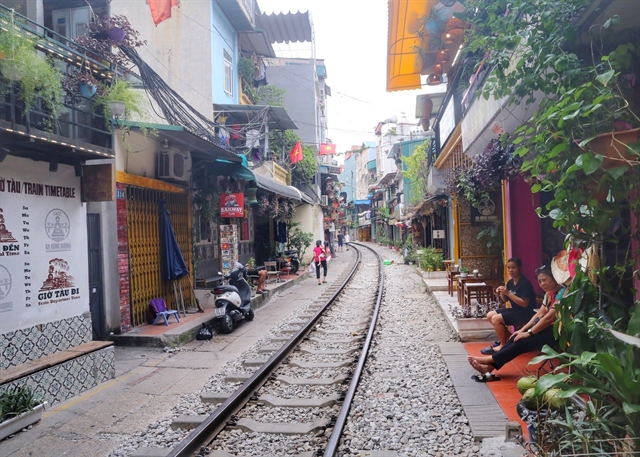.jfif) Opinion
Opinion

 |
| Cafe shops along the train street is now empty of tourists after the closure order from Hà Nội's authorities over safety concerns. — VNA/VNS Photo Tuấn Đức |
Trần Cao Thắng, head of the railway security and safety department under Việt Nam Railway Corporation (VNR), spoke to Vietnam News Agency on its request to halt café businesses in the famous ‘train streets’ in downtown Hà Nội.
Why did the agency issue a written request to stop operating the cafés and beverage businesses right next to the train tracks through the centre of Hà Nội?
According to the provisions of law, the scope of railway traffic safety corridor is 15m from both sides of the railway – calculated from the edge of the embankment footing for lines running between stations, or 2m from the outer edge of the rail line for lines within stations, ports, or separating walls.
Since 2018, foreign tourists started visiting, filming and taking photos on the rail line to the north of Hà Nội Railway Station. Notably, within the protected zone of this railway traffic safety corridor, people have put out stalls, tables and chairs to sell soft drinks to tourists. This area is located from Km0+595 to Km0+840 along Hà Nội – Đồng Đăng rail line.
When this phenomenon emerged, VNR directed Hà Hải Railway JSC to coordinate with Hà Nội and related units of the Việt Nam Railways Authority (Ministry of Transport) and Traffic Police Department (Ministry of Public Security) to issue fines against offenders and clear out violating sites.
Thanks to the coordinated enforcement between all levels of concerned authorities, at some point, the situation had improved. However, when the COVID-19 pandemic was brought under control and the country reopened, the infractions have made a strong return. And so we again asked Hà Nội City and related districts to take immediate measures to put a definitive end to this issue.
In order to ensure absolute security, order and traffic safety on the Hà Nội – Đồng Đăng line, the Hà Nội railway operator proposed the People's Committees of Ba Đình, Hoàn Kiếm districts as well as Hàng Bông, Cửa Nam, and Điện Biên Phủ wards, coordinate to stamp out the acts of selling coffee, beverages and other goods on the railway.
Units of the railway industry are ready to coordinate with People's Committees at all levels upon request.
We have determined clearly that this type of business gravely encroaches on the railway safety corridor, directly affecting the lives of people and tourists.
What can be done to prevent the recurrence of these types of businesses that infringe upon the safety corridor of train tracks?
For tourists and locals, we put out frequent recommendations and warnings, asking them to strictly comply with the regulations of the law on rail traffic order and safety. Because the risk of accidents is very high, it should be stressed that railway is not like other types of traffic, rail tracks are allotted specifically and exclusively to trains.
For business households engaging in providing this type of service here, VNR determines that they must also be held accountable if there is an impact on human life.
I want to emphasise that if this type of business should continue, it is necessary to obtain permission and closely coordinate with the State management agencies, such as the Ministry of Transport, Railway Authority, and Hà Nội People's Committee, and the implementation must be methodically and meticulously to minimise safety risks.
However, for VNR’s part, we maintain that this type of business constitutes a transgression of rail safety. — VNS




